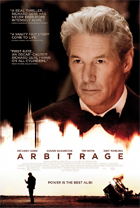Arbitrage
|  In Nicholas Jarecki’s assured directorial debut Arbitrage, Richard Gere plays Robert Miller, a master of the universe whose universe is in danger of collapsing around him. A billionaire hedge-fund manager who appears to be leading the most charmed of lives—wealth, privilege, public respect, a doting family—Miller is actually hiding a $400 million hole in his portfolio that he is trying desperately to cover by selling the investment firm he founded. Naturally, the firm’s sale involves intense scrutiny and audits by the bank that is buying it, so he has “borrowed” the $400 million from another investor who now wants it back, thus threatening to reveal that the emperor has no clothes—or at least that he lost his clothes in the 2008 crash. In Nicholas Jarecki’s assured directorial debut Arbitrage, Richard Gere plays Robert Miller, a master of the universe whose universe is in danger of collapsing around him. A billionaire hedge-fund manager who appears to be leading the most charmed of lives—wealth, privilege, public respect, a doting family—Miller is actually hiding a $400 million hole in his portfolio that he is trying desperately to cover by selling the investment firm he founded. Naturally, the firm’s sale involves intense scrutiny and audits by the bank that is buying it, so he has “borrowed” the $400 million from another investor who now wants it back, thus threatening to reveal that the emperor has no clothes—or at least that he lost his clothes in the 2008 crash.But, the bursting of his own personal bubble is just one of Miller’s problems. On the surface it appears that he has an ideal family life, complete with a supportive, loving wife of many years (Susan Sarandon) and two grown children who gather in his expansive Manhattan townhouse to throw him a surprise birthday party. That surface perfection is subverted by Miller’s affair with a French artist named Julie (Laetitia Casta), who he constantly slips away to see. Despite his attention and bankrolling her art, Julie is getting tired of being the sideshow and wants to be the main attraction. Miller’s refusal to leave his wife for her keeps her in a constant state of emotional frustration, giving him one more problem to juggle. In short, Robert Miller is a man stretched thin, and Arbitrage follows him over the course of a week as his rationalized, carefully controlled world teeters on the brink of ruin, particularly after he is involved in an unexpected event that results in a death. Wanting first and foremost to protect himself and his reputation, Miller runs from the scene and calls Jimmy Grant (Nate Parker), the son of a former business associate. The fact that Jimmy is a twentysomething black man who lives in Harlem and is trying to get his life back on track after trouble with the law suggests that Miller is simply using him, turning him into another pawn in his wide-ranging scheme to maintain respectability despite being a criminal several times over. And, when a determined police detective (Tim Roth) starts investigating the case, it comes down to a question of whether Miller is willing to let Jimmy play the fall guy, a genuine possibility given that, in the world of men like Robert Miller, men like Jimmy are expendable. As that brief plot summary suggests, Arbitrage is very much a film of our current times, joining the ranks of other recent cinematic outrages against the stacked financial system that rewards criminality as long as it is committed by people with wealth and power, including Oliver Stone’s Wall Street: Money Never Sleeps (2010), J.C. Chandor’s Margin Call (2011), and even Brett Ratner’s comedy Tower Heist (2011). Arbitrage is different, though, as it is a more focused character study that draws us into the world of Robert Miller and tempts us with feeling sympathy for one of the fabled/despised financial elite who has hid behind wealth and privilege for most of his adult life and may now finally be realizing the limits of that veil. Richard Gere was an ideal choice in this regard, as his screen presence has always conveyed a slight distance. Gere’s performance is compelling and nuanced, drawing humanity out of a man who would otherwise join the ranks of Bernie Madoff as the loathsome poster children of greed at its worst. His extreme selfishness is evidenced by his willingness to hide things from his daughter (Brit Marling), who works as the chief financial officer of his investment firm. Even though his dishonesty forces her into his sinking boat, his intense desire to regain control of his life, even by dubious means, is strangely compelling. That Miller is a one-percenter so far removed from the vast majority of us (he doesn’t for example, know what an Applebee’s is—why would he?—and when accused by someone of trying to fix a problem with money, he says with exasperation, “What else is there?”) makes the film’s success in rendering his deeply flawed humanity all the more impressive. Similar to Robert Zemeckis’ Flight, Arbitrage engulfs us in a story about a man whose life is constructed on lies and then tears us between what we know intellectually (that Miller is a criminal who deserves to be punished) and what we feel emotionally (that we want him to somehow slip through the ordeal unscathed, thus proving Hitchcock’s admonition that cinematic suspense trumps morality). Whether there is even the possibility of redemption at the end is part of what makes the film so gripping. As a first-time filmmaker, writer/director Nicholas Jarecki (if his name sounds familiar, it’s because his brothers are documentary filmmakers Andrew and Eugene Jarecki) displays a sure hand in navigating tricky material. In addition to drawing excellent performances from Gere (arguably the best of his career), Susan Sarandon (whose doting wife turns out to be more cunning than expected), Brit Marling (whose dedicated daughter is the symbol of naïveté forever destroyed in the crossfire), and even former Victoria’s Secret model Laetitia Casta (whose mistress underscores her pouting with real fire), Jarecki gives the story a number of unexpected turns that generate a crescendo of moral conundrums, all of which culminate in the age-old philosophical dilemma of why wrongdoing isn’t always punished and good doesn’t always prevail. Without giving too much away, I can say that Jarecki draws his story to a close in a way that confirms the worst but also suggests that, while specific crimes may go unpunished, their weight will not immediately—or perhaps ever—dissipate. Copyright ©2012 James Kendrick Thoughts? E-mail James Kendrick All images copyright © Roadside Attractions |
Overall Rating: 


 (3.5)
(3.5)


